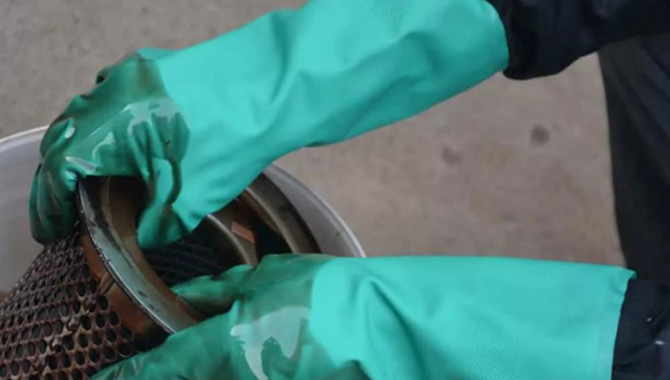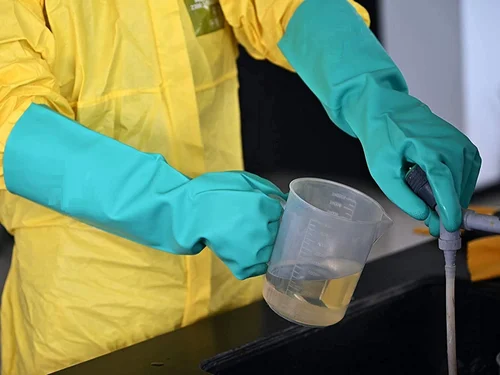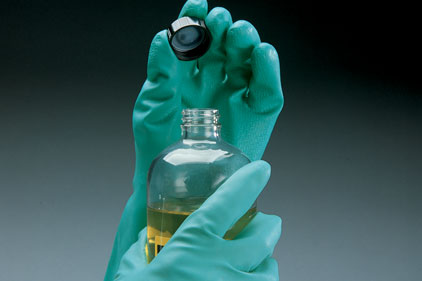In daily life, hands, as the most commonly used, most convenient, and simplest tool, play an indispensable role. Because they are fast and easy to use, we often fail to give them the protection they deserve. According to research data, nearly 20% of injuries each year involve the hands, making hand protection an issue that cannot be ignored.
The first lesson in protecting your hands is to perfectly recognize and identify the dangers present in your environment and understand what kind of irreversible damage these dangers could cause to your hands. By targeting these risks, you can determine which type of gloves can fully resist such potential threats. This is especially important when handling hazardous chemicals, as chemical substances can cause unbelievable harm to the skin on your hands. However, chemical-resistant safety gloves, which are specifically designed to combat chemical hazards, can fully prevent these issues and serve as the last line of defense for protecting the skin on your hands and wrists.

The Harm Chemicals Cause to Humans
The impact chemicals have on the human body mainly depends on the type of chemical, the duration of exposure, and the length of time your hands are exposed to the substance. Some special chemicals can cause massive and irreversible harm to the human body, requiring extreme caution during use.
In severe cases, short-term exposure to large amounts of chemicals can cause immediate life-threatening injuries such as breathing difficulties, pulmonary edema, and permanent damage to the liver and kidneys, as well as increasing the risk of cancer. In less severe cases, it may cause vomiting, diarrhea, dizziness, headaches, and other basic injuries.
Note: Never casually enter an environment containing chemicals. Always wear professional personal protective equipment and proceed with caution.

Why Use Chemical-Resistant Gloves in the Workplace?
Like any personal protective equipment, the purpose of using chemical-resistant gloves is to protect against harmful chemical exposure, ensure personal safety, prevent occupational diseases, protect the skin from corrosion, block corrosive liquid penetration, and prevent chemicals from entering the bloodstream through the skin. They also help reduce direct contact with allergens and slow the development of chronic skin conditions.

Types of Chemical-Resistant Safety Gloves
Chemical-resistant gloves are specially designed to protect against biological hazards, chemicals, solvents, and other harmful substances. Therefore, they are generally made from synthetic materials with strong chemical resistance and durability. However, each type of glove has its own characteristics. Below, we introduce several common types of chemical-resistant safety gloves to help you understand them more quickly and thoroughly.

Natural Rubber Gloves
Natural rubber gloves are made from the sap extracted from the bark of the Brazilian rubber tree through tapping. After a series of fine processing steps including filtration, chemical additive mixing, molding, heating, curing, washing, and rinsing, they are formed into the final product. They effectively isolate bacteria, viruses, and chemical substances while maintaining excellent elasticity and flexibility, offering high tactile sensitivity. They are often referred to as a “second skin.”
When handling mild or diluted chemicals such as diluted sulfuric acid, diluted hydrochloric acid, ethanol, and isopropanol, latex gloves provide basic protection and can safeguard hands during heavy-duty cleaning tasks from harm caused by detergents and cleaning agents. However, when dealing with strong acids, strong alkalis, acetone, methyl ethyl ketone, ethyl acetate, and other highly corrosive or organic solvent chemicals, their protective capabilities are very limited.
Note: Some individuals may have allergies to the proteins in natural latex. To avoid allergic reactions, it is recommended to use nitrile-coated gloves instead.

Nitrile Gloves
Nitrile gloves are made from nitrile rubber, a synthetic material polymerized from acrylonitrile and butadiene. They offer excellent chemical resistance, especially in terms of oil and organic solvent resistance, outperforming natural latex and PVC gloves. They can effectively resist damage from oils, petroleum products, alcohols (ethanol, isopropanol, methanol), and mild acid and alkali chemicals (diluted hydrochloric acid, diluted sulfuric acid, diluted sodium hydroxide). However, their flame resistance is poor, so they should not be used with ketones, oxidative acids, or nitrogen-containing organic chemicals.

Neoprene Gloves
Neoprene gloves are made by polymerizing chloroprene via free-radical polymerization to produce polychloroprene segments. These gloves offer chemical resistance comparable to nitrile gloves and provide excellent protection against strong acids (sulfuric acid, nitric acid, phosphoric acid) and strong bases (sodium hydroxide, potassium hydroxide), as well as alcohols (ethanol, propanol) and organic acids (acetic acid, formic acid), and hazardous chemicals such as cleaners and disinfectants. Compared to nitrile gloves, they are more flexible and offer better sensitivity and dexterity, making them ideal for precision work. However, they should not be used with concentrated nitric acid or chromic acid, which are inorganic oxidizers.

PVC Gloves
PVC gloves are made from polyvinyl chloride, a thermoplastic material formed by polymerizing vinyl chloride. They can briefly withstand contact with diluted acids, diluted alkalis, alcohols, vegetable oils, animal fats, ammonia water, detergents, bleach, nitric acid, chromic acid, hydrochloric acid, phosphoric acid, and other diluted oxidizing agents. However, they should not be exposed to laboratory-strength concentrated acids, high-corrosion solvents, acetone, ketones, ethers, aromatics, or chlorinated solvents for extended periods, as this may cause severe consequences.

Butyl Gloves
Butyl gloves are made from butyl rubber, a synthetic rubber formed by copolymerizing isobutylene with a small amount of isoprene. They are renowned for their air-tightness, acid resistance, and solvent protection capabilities. Butyl gloves can resist strong acids such as sulfuric acid, nitric acid, hydrofluoric acid, and strong polar solvents like ketones, aldehydes, and esters, as well as toxic gases. In the cleaning industry, they can be used with methyl ethyl ketone, acetone, and other similar cleaning agents. However, they are generally expensive and not favored by all industries.

Fluor rubber Gloves
Fluor rubber gloves are made from fluorinated alkenes (e.g., hexafluoropropylene) copolymerized with other alkenes (e.g., vinylidene fluoride, tetrafluoroethylene) to produce synthetic fluor rubber. These high-performance chemical-resistant gloves are the most expensive among chemical gloves but also the most effective in handling chemicals. They are known for their outstanding chemical resistance and heat resistance and can handle the most corrosive and difficult-to-defend chemicals such as sulfuric acid, nitric acid, aqua regia, ketones, esters, aldehydes, gasoline aromatics, chlorinated hydrocarbons, strong acids and bases, and polar solvents. They are especially adept at handling aromatic hydrocarbons such as benzene, toluene, and xylene.

Summary
The types of chemical-resistant safety gloves are diverse, each with its own characteristics and suited for different work environments. If you are interested, please contact us as soon as possible. Aibon will be fully committed to answering your questions.
How to Measure Glove Sizes – Source: AIBON
Latex gloves– Source: AIBON
Safety gloves– Source: AIBON
Working gloves– Source: AIBON

